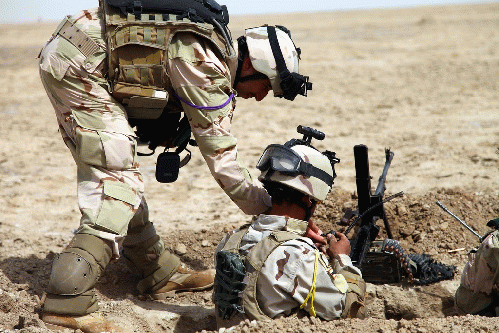From Grayzone
Biden's popular and long overdue withdrawal from Afghanistan triggered a big media meltdown that exposed its de facto merger with the military.
In the wake of a remarkably successful Taliban offensive capped by the takeover of Kabul, the responses of corporate media provided what may have been the most dramatic demonstration ever of its fealty to the Pentagon and military leadership. The media did so by mounting a full-throated political attack on President Joe Biden's final withdrawal from Afghanistan and a defense of the military's desire for an indefinite presence in the country.
Biden's failure to establish a plan for evacuating tens of thousands of Afghans seeking to the flee the new Taliban regime made him a soft target for the Beltway media's furious assault. However, it was Biden's refusal last Spring to keep 4,500 U.S. troops in Afghanistan on an indefinite basis -- flouting an aggressive Pentagon lobbying campaign -- that initially triggered the rage of the military brass.
The media offensive against Biden's Afghan withdrawal advanced arguments that the military could not make on its own - at least, not in public. It also provided the military with important cover at the moment when it was at its most vulnerable for its disastrous handling of the entire war.
Among the most disingenuous attempts at salvaging the military's reputation was a Washington Post article blaming the Afghan catastrophe on an over-emphasis on "democratic values" while ignoring the the tight alliance between the U.S. military and despotic warlords which drove local support for the Taliban.
Playing the al Qaeda threat cardOn the eve of the Taliban takeover of Kabul, the New York Times's David Sanger and Helene Cooper fired the opening salvo of the Beltway media's assault on Biden's decision. Sanger and Cooper began by acknowledging that the U.S. military had "overestimated" the results of its intervention for years, and that the failure of the Afghan government to pay soldiers for months had sapped the will to resist the Taliban.
But they then homed in on Biden's refusal to keep troops in Afghanistan for counter-terrorism purposes. Recalling that Joint Chiefs Chairman Gen. Mark A. Milley had tried in the Spring to compel Biden to maintain 3,000 to 4,500 troops in the country, Sanger and Cooper cited "intelligence estimates predicting that in two or three years, Al Qaeda could find a new foothold in Afghanistan."
That speculation was based on the assumption that the Taliban would allow such a development despite its well-established record of opposing al Qaeda's use of its territory to plan terrorism abroad. In fact, the Taliban's policy went back to before 9/11, when Osama bin Laden formally agreed to honor the Taliban's restrictions while secretly plotting the 9/11 attacks in Germany rather than in Afghanistan.
In the wake of the U.S. withdrawal, the Taliban has an even stronger motivation to prevent any jihadist organizations from planning international terror attacks from Afghan territory.
To support their broadside against Biden's withdrawal, the Times' Sanger and Cooper turned to the retired general with arguably the greatest personal vested interest in an indefinite U.S. military presence in Afghanistan: former U.S. commander in Afghanistan Gen. David Petraeus, who oversaw the war effort from 2010 through 2011 and has since led a group of former commanders and diplomats lobbying for an endless US presence in the country.
Petraeus asserted that Biden failed to "recognize the risk incurred by the swift withdrawal" of intelligence drones and close air support, and thousands of contractors who had kept the Afghan Air Force flying."
Next, Sanger and Cooper turned to Richard Fontaine, the chief executive of one of the most militaristic think tanks in Washington, the Center for a New American Security (CNAS).
(Note: You can view every article as one long page if you sign up as an Advocate Member, or higher).






